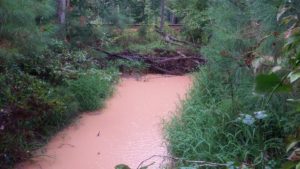This is the second part of our 2016 Stanback Intern Nick Younger’s reflection on the state’s Rules Review Commission and how this group impacts our lives and our environment. You can find his introductory blog here.
My work this summer focused on the enforcement of Sedimentation Control in North Carolina. I was the Dirt Intern and I wear that title proudly. Any time sedimentation control becomes a hot topic, I was all over it.
In January 2016, the Rules Review Commission (RRC) determined the status of certain NC Department of Environmental Quality (DEQ) rules, namely the Sedimentation Control section (his is like Christmas Day for me; instead of hot chocolate and mistletoe, it was dirt and public policy.)

The RRC deemed a handful of these rules “unnecessary” during its last meeting in February, essentially advocating for the retirement of certain rules. Most of the “unnecessary” rules involve mundane clarifications like the ever exciting 15A NCAC 04c .0109, which states that the agency’s director accepts all tenders of payment on behalf of the secretary. How riveting!
However, the NC League of Conservation Voters cares about a specific sediment rule: 15A NCAC 04B .0126 (e). This rule sets the monetary amount for the plan review fee under the Sedimentation Pollution Control Act (SPCA). This review fee helps the Sedimentation Control Commission (SCC) protect NC waterways from sedimentation pollution by providing vital funds to inspect and supervise construction and land maintenance sites that may damage local water quality.
Sedimentation pollution occurs when contaminants from construction sites seep into surrounding groundwater. Currently, the fee for inspection of these sites is too low to safeguard water. The SCC proposed raising the cost of this fee, as it would enable them to inspect sites more frequently and ensure compliance with pollution-protection plans under the SPCA. Since the RRC determined the rule to be “unnecessary,” it will likely change. However, we cannot be sure whether that change will translate into more funding for the enforcement agency to do its job or further hamper the efforts of enforcing sedimentation control laws by reducing the fee even further.
NCLCV believes the RRC should increase the review plan fee, providing the strapped Commission with more resources to inspect possible sites of pollution around build sites and construction with greater diligence. Governor Pat McCrory left the plan review fee increase out of the state budget for the second year in a row. The increase proposal protects North Carolina’s waters from the emergence of additional threats to safety and quality. It is much easier to address pollution impacts before they start – saving money, time, and future environmental damage. With this rule now “unnecessary,” we may see substantial changes in Sedimentation Control, and a reduction of the risks threatening NC drinking water. You know our drinking water…that we drink…to live.



